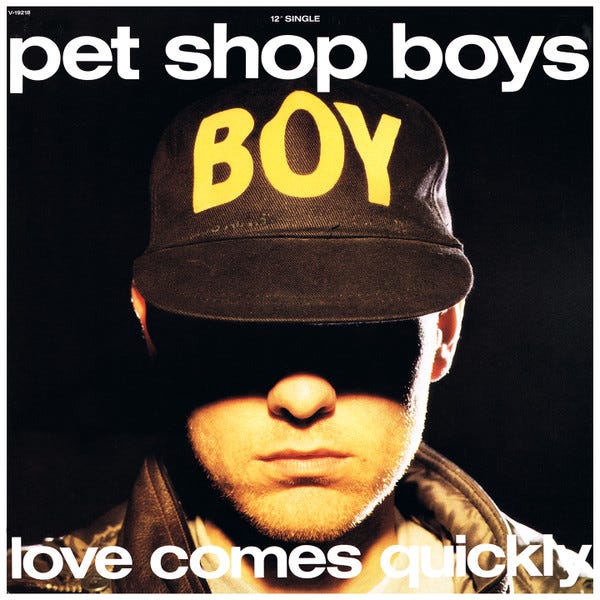"What Have I Done To Deserve This?" - Pet Shop Boys
On Doing It for the Culture
Though once accused of queerbaiting, the Pet Shop Boys might be gay culture’s most devoted preservationists.
Following weeks of social media vitriol targeting teen actor Kit Connor about his portrayal of a queer character in Netflix’s coming-of-age series Heartstopper, the actor tweeted an angry response: “I’m bi. Congrats for forcing an 18-year-old to out himself. I think some of you missed the point of the show.” Connor plays the role of Nick Nelson, a high-schooler working through his feelings for a male classmate and ultimately coming out as bisexual. When Connor was spotted in public holding hands with actress Maia Reficco, he was quickly accused of queerbaiting, leading to his coming out via Twitter.
The term “queerbaiting” was first used in the early 2000s as a criticism of music, movies, TV, and books that hint at queerness without ever explicitly admitting to it (like when J.K Rowling told fans that Dumbledore was gay despite a shred of evidence). And the term has expanded to encompass a broader critique of straight celebs who appropriate queer culture. Artists capitalize on shock value and intrigue to attract fans while titillating the media — all without the pesky repercussions of actually being out and queer. Stars like Harry Styles and Ariana Grande have both been accused of queerbaiting in recent years. The term might be new, but the sentiment isn’t.
Take for instance the English synth-pop duo Pet Shop Boys, who burst onto the scene in 1984 with their first single, “West End Girls.” British pop music at the time was overrun with queer artists, though only a handful were out of the closet. In 1994, 10 years into Pet Shop Boys’ hugely successful career, Bronski Beat lead singer Jimmy Somerville used an interview with NME magazine to accuse the Pet Shop Boys of capitalizing on queer culture without being part of it. Somerville was an out and proud gay man, making him the rare exception among peers who considered living openly career suicide.
In response, lead Pet Shop Boy Neil Tennant reluctantly came out of the closet.
By then, Tennant and fellow Boy, Chris Lowe, had spent their careers celebrating queer culture and using their fame to resurrect so many fading icons that their list of collaborations reads like a Pride parade. Out or not, the Pet Shop Boys have always been queer music history’s most significant preservationists.
From moment one, the Pet Shop Boys started shooting flares for gay culture. Every song on the debut album, Please, uses non-gendered language to keep subject matter ambiguous. Both Tennant and Lowe sported clothes from the BOY London fashion brand. BOY was at the time considered a queer brand, as the first major fashion label to support LGBTQ+ causes in the early ‘80s. Lowe wears a baseball cap with the word “BOY” emblazoned in block letters on the album sleeve of the 1986 single, “Love Comes Quickly.” The duo recalled in a 1999 interview with the Montreal Mirror that they expected audiences would read into their “incredibly gay” choice to sponsor the brand.
Their second No.1 single, 1987’s “It’s a Sin,” was a campy rejection of Tennant’s Catholic upbringing. The duo hired acclaimed gay avante-garde artist Derek Jarman to direct the music video. In it, Tennant pleads for his life as religious zealots have bound him in chains and fire up the stake on which they’ll burn him for unnamed sins.
When I look back upon my life
It's always with a sense of shame
I've always been the one to blame
For everything I long to do
No matter when or where or who
Has one thing in common too
It's a, it's a, it's a, it's a sin
It's a sin
Jarman contracted HIV in 1987 and when his health was declining, the Pet Shop Boys played at Jarman’s art show entitled “QUEER” to raise money for an AIDS charity. The band honored him with a cover of the Village People’s “Go West.”
“I thought it would be a good song to play at a Derek Jarman event — a song about an idealistic gay utopia,” said Lowe. “I knew that the way Neil would sing it would make it sound hopeless — you've got these inspiring lyrics but it sounds like it is never going to be achieved.”
(Editor’s Note: I encourage you to read an incredibly touching and in-depth article about the story of “Go West” written by Substack author Bernard O’Leary of This Week in the 90s. The previous quote is pulled directly from that article.)
The band’s proximity to queerness through fashion, song choice, and collaborations were enough for gay audiences to claim the Pet Shop Boys as their own. Pitchfork journalist Alfred Soto writes, “In retrospect, the clues were easy to spot, but the best indication that Lowe and Tennant weren’t straight was their choice of clients.”
Perhaps the most famous example is their 1987 collaboration with former 1960s pop diva, Dusty Springfield. Throughout the ‘60s, Springfield dominated the charts with hits like “I Only Wanna Be With You” and “Son of a Preacher Man,” but her career took a nosedive when she became the first pop star to come out in 1970. By the ‘80s, Springfield was destitute and struggling with addiction. “Dusty was, to us, a legend,” said Tennant in an interview with Classic Pop magazine. “When we met her, she was living in a pay-by-day Hollywood motel. She was really at rock bottom. It was a sublime moment hearing her sing our music.”
The production process for “What Have I Done to Deserve This?” was strained. Springfield had a reputation as a perfectionist in the studio and was insecure about the quality of her voice after being out of the spotlight for so long. Sound mixer Julian Mendelsohn said in an interview with Sound on Sound that Springfield demanded several takes in order to get her vocals recorded to her satisfaction. “I remember Neil and I looking at each other as if to say, 'Christ, this is going to take forever.' And it did take forever. We ended up having to sift our way through 20 tracks of vocals, but we got a fantastic result in the end, at which point we looked at each other as if to say, 'Well, that's why she took so long.'" The effort paid off when the single reached No. 2 on the U.K. charts, making it Springfield’s biggest hit since 1966’s “You Don’t Have to Say You Love Me.”
After resurrecting the career of a queer hero, Pet Shop Boys would do it again two years later for another icon, Liza Minnelli. Their collaboration on Results in 1989 sent the lead single, “Losing My Mind,” to No. 6 on the U.K. charts.
By the time Tennant was coaxed out of the closet in 1994, the band’s list of partnerships with queer icons included both Boy George and Kylie Minogue. For George, they produced the hit single for the LGBTQ thriller, The Crying Game.
Requests to collaborate kept rolling in and by 1996, the Boys reached gay boss level by collaborating with the very star who invented the alchemy that transformed the shock value of queerness into gold — David Bowie. Plenty of musicians had come out before Bowie proclaimed his bisexuality in 1972, but unlike Dusty Springfield who was crucified for her bravery, Bowie became the risen god of rock n roll. By 1996, he had hung up his pretty dresses in exchange for sensible ties and trousers. But Bowie knew exactly who to call for help when he was ready to revisit the androgynous themes that made him famous. He commissioned the Pet Shop Boys to remix his single, “Hallo Spaceboy,” which he felt wasn’t good enough. The song is reminiscent of his early gender-bending hits like “Rebel Rebel” and “Boys Keep Swinging.”
Don't you want to be free
Do you like girls or boys
It's confusing these days
The single reached No. 12 in the U.K. Bowie pulled his high heels out of the archives just long enough to perform alongside the Pet Shop Boys at the 1996 Brit Awards and Top of the Pops, giving a nod to his old androgynous persona.
The Pet Shop Boys are listed in the Guiness Book of Records as the most successful duo in U.K. history. They’ve racked up a staggering 44 Top-40 hits. For the entirety of their career, they’ve leveraged their own success to exalt the legacies of their queer heroes. And not just their musical heroes.
Tennant leveraged the pleading of conservative Prime Minister David Cameron for the band to perform at the 2012 Summer Olympics in London into an agreement that the British government posthumously pardon gay scientist Alan Turing, whose code-breaking machine helped defeat the Nazi regime in World War 2. Turing was prosecuted in 1952 for homosexual acts and forced to undergo chemical castration, which ultimately led to his suicide.
The pardon, made possible by the Pet Shop Boys, had a ripple effect. In September 2016, the government announced its intention to expand this retroactive exoneration to other men convicted of similar historical indecency charges, in what is informally called the “Alan Turing Law.”
Not bad for an insanely danceable synth-pop band.
The truth is their contributions extend far beyond hit singles. Neil Tennant and Chris Lowe might be two of pop culture’s most important queer historians and preservationists. So when Bronski Beat’s Jimmy Somerville accused the band of capitalizing on gay culture “for career purposes and not putting anything back,” the attack felt misplaced and arrogant according to Tennant. In his 1994 coming-out interview with Attitude, Tennant said this:
“When Bronski Beat came along, I loved the fact that they were gay, and that they were so out about it. It was the whole point of what they were doing. Jimmy Sommerville was, in effect, a politician using the medium of pop music to put his message across. The Pet Shop Boys came along to make fabulous records, we didn’t come along to be politicians. Having said all that, we have supported the fight for gay rights. I do think that we have contributed, through our music and also through our videos and the general way we’ve presented things, rather a lot to what you might call ‘gay culture.’ And the simple reason for this is that I have written songs from my own point of view. I am gay, and I have written songs from that point of view.”
Did you catch last week’s issue?








Feeling like a Pet Shop Boys fan.
Here for the Twit90s & Songs That Saved Your Life mashup.